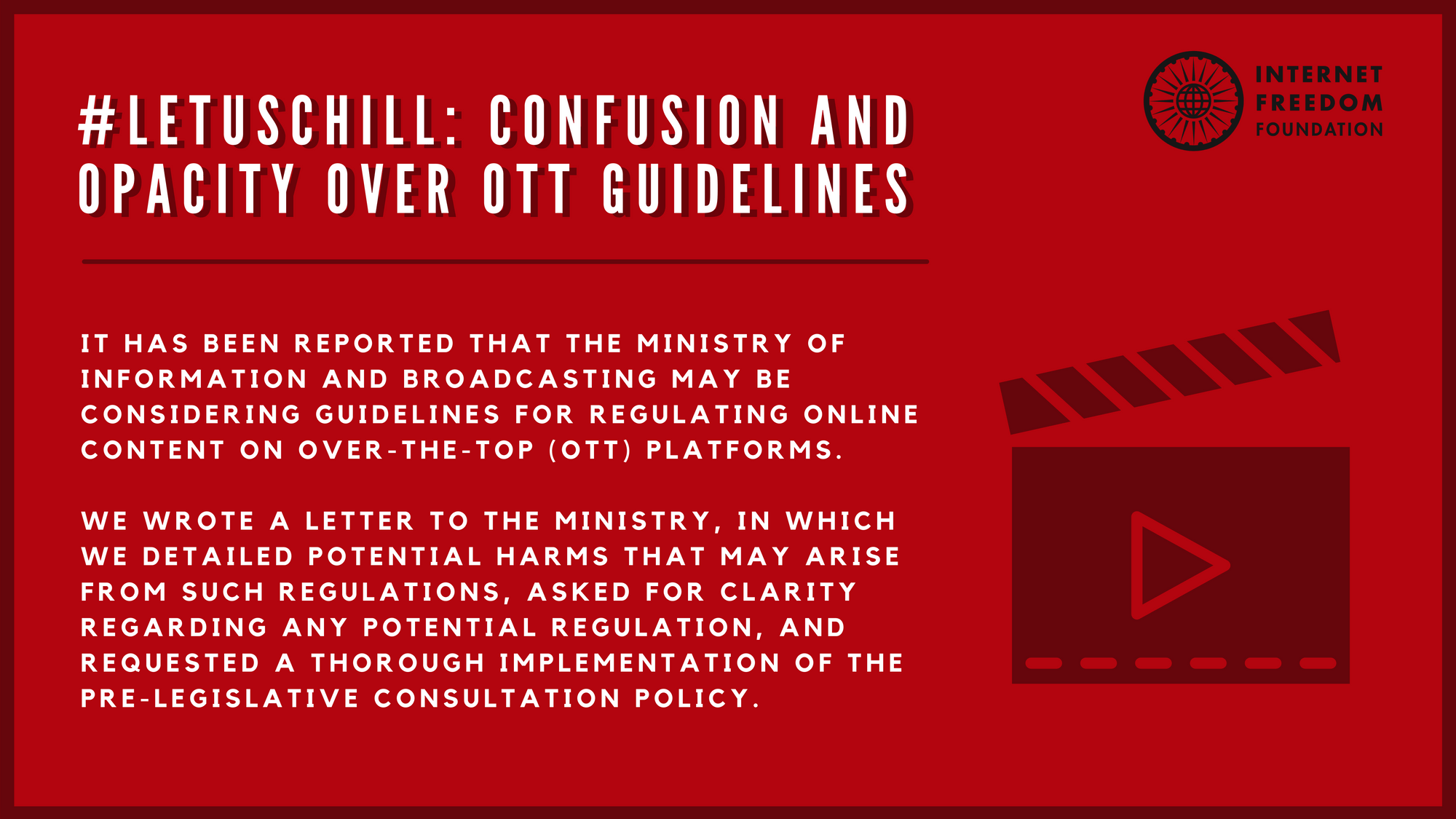
tl;dr
It has been reported that the Ministry of Information and Broadcasting may be considering guidelines for regulating online content on Over-The-Top (OTT) platforms. We wrote a letter to the Ministry in which we detailed potential harms that may arise from such regulations, asked for clarity regarding any potential regulation, and requested a thorough implementation of the pre-legislative consultation policy.
Potential regulations for OTT
Recently, multiple disquieting media reports (see here and here) about possible legislation to regulate OTT platforms of curated content such as Netflix, Amazon Prime, Hotstar etc. This is especially concerning after the recent furore over the web series Tandav (see here and here), the latest in a long line of incidents in which there was public outcry over a perceived slight to religious beliefs. Such events seem to have put enough public pressure to make the Information and Broadcasting Union Minister Prakash Javadekar to explicitly state that guidelines for OTT platforms shall be forthcoming.
Any potential legislation regarding the OTT video streaming sector in India may cause immense harm to individual rights as well as the national interest. Today, India is no longer a consumer but a producer of original high quality video content that provides employment and entertainment to audiences locally and globally. It competes actively with other countries such as South Korea and needs an environment that recognises that traditional cinema or television based regulation may irreparably harm the sector. Any such model of regulation will likely have a substantial impact on citizens’ digital rights, result in economic harm, and also negatively impact India's growing cultural influence through the production of modern and contemporary video formats entertainment. We have written about more potential harms here.
The broader picture
In November last year, a Cabinet Secretariat notification amended the Government of India (Allocation of Business) Rules, 1961 and designated the Ministry of Information and Broadcasting as the nodal ministry under which regulation of online media falls. We have written about the implications here before here, detailing possible harms towards the freedom of journalistic expression and artistic creativity.
Moreover, there is no underlying enactment or legal authority for the Ministry to conduct actions which may cause censorship (such as receiving complaints and forcing content to be removed). Hence, there is a clear absence of any legal power to take such actions. Public policy harms may also result from the Ministry becoming grievance redressal cell (as has been the case with the recent controversies over various online media content), where its principal function may become being a post office for wide ranging grievances around the incredible diversity of content that exists on the internet. This may further stoke greater forms of censorship in a sector that is witnessing a high amount of creativity and demonstrating India’s leadership in the cinematic arts especially suited towards younger and global audiences.
Recommendations
If no such legislative intervention is being contemplated, we request that a press statement must be put out at the earliest, if only to quell anxiety and dispel rumours.
However, if any such legislation is indeed being discussed:
- It needs to be put through a robust process of public consultation in line with the Pre-legislative Consultation Policy.
- Ideally, such a process would be initiated by the release of an approach paper outlining the vision for the regulations, if any. It should also be open to considering whether a policy of forbearance from legislation may be the correct prescription at this moment in time.
- Subsequently, an independent committee must be constituted. This committee must compose of noted artists, creative professionals, and academics with an emphasis on ensuring a diversity of perspective and expertise as well as a lack of political bias - this will ensure a greater amount of trust in the committee in the public sphere.
Important Documents
- Letter to Ministry of Information and Broadcasting the need for Transparent and Public Consultations on any potential regulations for OTT Video Streaming Platforms dated February 3, 2021 (link)
